A Secular Understanding of Dependent Origination: #12 Aging and Death
 |
|
The final field of dependent arising is “aging and death” — a metonym for impermanence and dukkha. On a literal level, if it were not for aging and death — for things being impermanent — there would be no dukkha at all. If we always were able to keep the things we obtained and found we enjoyed — if they were permanent — we would not ever suffer for the loss of the things we made a part of our lives. In this way, literal aging and death are the field in which the final result of the twelve links grows: our misery feeds on the impermanence represented by the way things age and pass away, and on the way *we* age and pass away, too. Every aspect of the world that we find necessary to our sense of who we are will change, will eventually be lost. Every definition we create in an attempt to make the world seem stable and knowable will also prove impermanent because all things are unstable and not completely knowable.
In other suttas this step is given greater range with “sorrow, lamentation, pain, grief and despair” [MN 11] and this is the actual point: that all the efforts we have put into our understanding of the way the world works, and the way we fit into it, and what we are supposed to do to make our lot better — all the times we argue with others about what it’s all about and ignore their good points, and focus on their failures in logic, completely miss when someone pulls apart our logic, and only notice when we score a point — all that effort, all our certainty about how if we just get this one more possession, achieve this one more goal, do one more retreat, get one more raise, get one more lover we will finally be happy — all that ends, not in bliss, but in dukkha, in sorrow and lamentation. This is where all our efforts at putting the world together in a way that will make us happy, and protecting that self to an excessive degree, tend to lead: not towards safety and comfort, but towards false expectations and misplaced energy.
We’re not going to end our aging or prevent our death with our practice — as much as the literal description might lead us to think that’s what this step is about — what it’s really asking us to do is to notice how making our sense of who we are dependent on things that aren’t really part of us, things that (like us) won’t last — leads to all that misery. This is not to say that we shouldn’t enjoy things that are impermanent; it only says that we shouldn’t make our happiness so contingent on them that when they pass away we feel like we died too. Recognizing the impermanence of whatever we love, and that it will pass away (or we will) lets us more fully appreciate what we have in the moments we have it.
Table of Contents for A Secular Understanding of Dependent Arising
